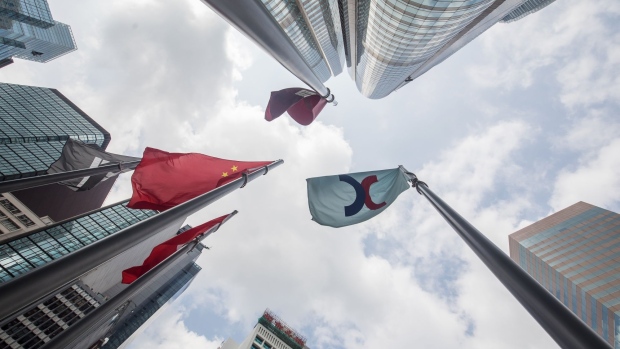Jan 14, 2021
Hong Kong’s Biggest ETF Resumes Buying Stocks Banned by U.S.
, Bloomberg News

(Bloomberg) -- The largest exchange-traded fund tracking the Hang Seng Index will resume buying shares of Chinese companies included in a U.S. investment ban, marking a U-turn by State Street Corp. after it was criticized by Hong Kong’s former central bank chief.
The $13 billion Tracker Fund of Hong Kong, the city’s most actively traded ETF, said in a statement late Wednesday that it reversed a decision announced just two days earlier to stop making new investments in companies included in the U.S. ban. The about-face boosted shares of China Mobile Ltd., which has swung wildly over the past week on confusion over how global investment funds would respond to the U.S. order.
State Street’s initial decision had attracted scrutiny from the Hong Kong Monetary Authority and was criticized by former HKMA chief Joseph Yam in interviews with local media. U.S. banks and money managers are responding to President Donald Trump’s ban on investment in companies deemed to be owned or controlled by China’s military.
State Street said in a separate statement Thursday that the ban doesn’t apply because the Tracker Fund and its manager, State Street Global Advisors Asia, are considered to be non-U.S. persons.
The Asia unit “is able to continue to manage the fund’s portfolio to track the Hang Seng index, including making new investments in securities sanctioned under the Executive Order,” it said. The firm reiterated on Wednesday that the Tracker Fund is no longer appropriate for U.S. investors.
The HKMA has “noted the latest developments and will continue to keep a close watch over the matter,” it said in an emailed statement.
Read how Trump’s ban is spurring a Wall Street pullback
China Mobile, one of the three Chinese telecommunication operators included in Trump’s ban, climbed as much as 3.4% on Thursday morning in Hong Kong. The stock has a 2.6% weighting in the Hang Seng Index, according to data compiled by Bloomberg.
The Tracker Fund was set up in 1999 to dispose of shares acquired by the Hong Kong government in its fight against speculators during the Asian financial crisis. It’s now widely used by institutional investors as a proxy for the Hong Kong stock market or to hedge risks. Hang Seng Bank Ltd. provides a competing product that’s about half the size of the State Street ETF.
Americans Won’t Be Banned From Investing in Alibaba, Dow Jones Reports
The issue threatened to roil Hong Kong’s pension industry, given that eight of the city’s 18 Mandatory Provident Fund Scheme sponsors provide the Tracker Fund as an investment option, according to MPF Ratings Ltd. Among those include plans provided by Principal Trust Co. (Asia) Ltd., Fidelity and Invesco Ltd., according to the website.
MSCI Inc. and S&P Dow Jones said last week they would drop Hong Kong-traded shares of China Mobile, China Telecom Corp. and China Unicom Hong Kong Ltd. from benchmarks. That prompted index-tracking funds to unwind positions at short notice, pushing the shares’ trading volume to 18 times the daily average of the previous three months.
BlackRock Inc. also reduced its holdings and plans to keep selling, a person familiar with the matter said this week. The world’s largest money manager has an ETF that tracks the Hang Seng.
Vanguard Group said this week that it liquidated all of its holdings of U.S. sanctioned Chinese companies.
(Updates with HKMA statement in sixth paragraph)
©2021 Bloomberg L.P.





